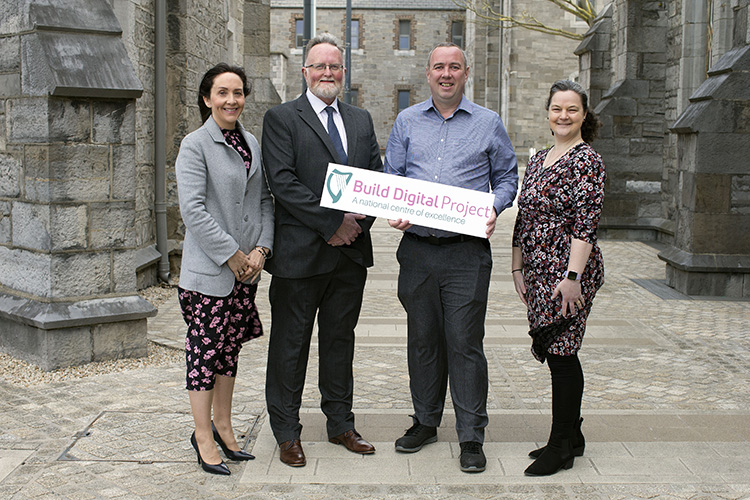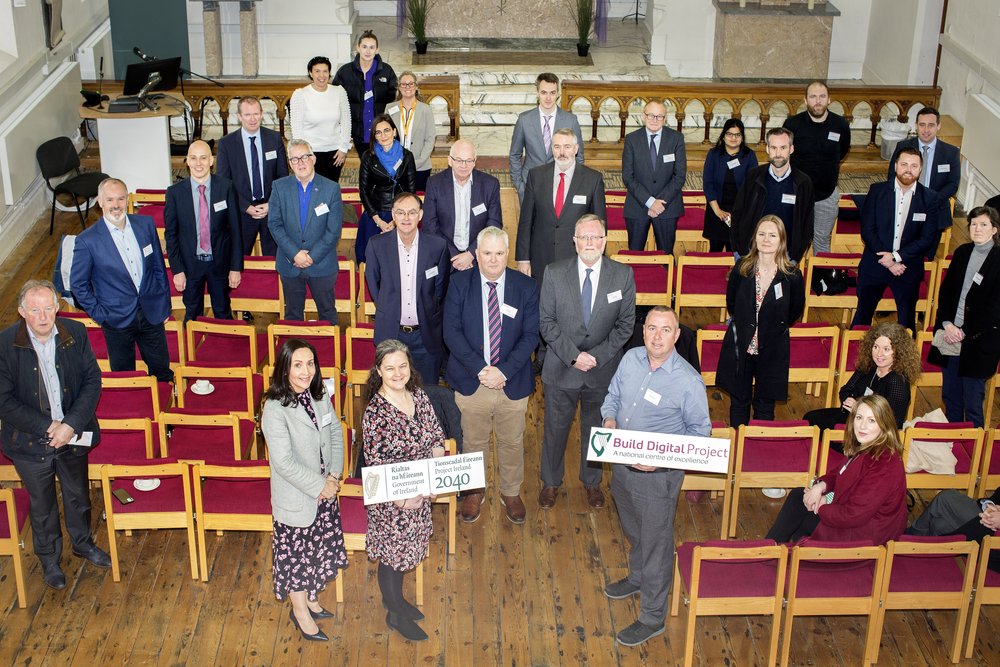
BARRY MCCALL explains how the Build Digital Project aims to change Irish construction as we know it and speaks with Robert Moore, Build Digital Project Lead, about the ambitious five-year programme of work that lies ahead.
There is widespread agreement that the ambitions set by the government’s Project Ireland 2040 and Housing for All will not be achieved without fundamental changes on the part of all stakeholders in the construction industry, particularly in relation to digitalisation and the adoption of a more industrialised approach.
The Construction Sector Group’s Innovation and Digital Adoption subgroup was established in September 2020 to deliver on the seven priority actions detailed in the Construction Sector Group Building Innovation Report arising from the KPMG/ Future Analytics/ TU Dublin Economic analysis of productivity in the Irish construction sector from 2019. The seventh of those actions was the funding of a Build Digital Project by the Department of Public Expenditure and Reform.
The Build Digital Project’s aim is to ensure that world-class digital practices, which already exist in certain elements of the construction sector, are adopted throughout the industry and supply chain to create a more sustainable and innovative sector from top to bottom and vice versa. The project will achieve this goal by providing guidance and leadership on the digital tools, standards, approaches, and education and training required by the sector.

Build Digital Project
Last November, the Minister for Public Expenditure and Reform, Michael McGrath, announced that a consortium led by TU Dublin with CitA (Construction IT Alliance) as co-applicant, and partners Atlantic Technological University, Munster Technological University, University College Dublin, and South East Technological University had been awarded €2.5m in funding over a five-year period to establish and deliver the Build Digital Project.
Build Digital Project actions
According to Build Digital Project Lead Robert Moore, the project will involve a comprehensive range of actions, including:
- Establishing an Irish Build Digital Leadership Forum to coordinate and lead the sector in digital adoption
- Delivering the Irish Build Digital Exchange Hub, an open, accessible online space for resource, learning and knowledge sharing across the sector;
- Undertaking an annual national survey to monitor progress, impact, developments in respect of digital adoption and sectoral transformation;
- Engaging widely across the sector and partnering globally to provide access for Irish organisations to international best practice for adoption and adaptation;
- Identifying, monitoring, and publishing information on living lab projects of different scales, types, and locations, in collaboration with public and private sector clients;
- Developing an Irish Information Management (BIM / Digital Construction) Framework to support industry in the adoption and utilisation of ISO standards and associated guidance;
- Improving the quality, consistency, and availability of education and training supports for digital adoption;
- Developing supports for sustainable digital procurement and product identification standards adoption; and
- Benchmarking progress under Build Digital against international comparators.
The Five Pillars of Build Digital
These actions will be delivered through a programme of work spanning five pillars of interconnected activities. Each pillar is populated with industry experts, early adopters, and challengers who, as the ‘voice-of-customer’, will work with full-time innovators and academic leaders to adapt international and national best practice and to develop novel solutions to transform Irish construction.
The pillars will, in effect, act as specialist industry and stakeholder forums. Supports in the form of tool kits, guidance, exemplars, and templates will be produced by each pillar, with full interoperability and cognisance of the needs of all stakeholders, particularly SMEs, clients, and suppliers. These supports will be distributed and made available openly through the Irish Build Digital Exchange Hub.
The five pillars are:
- Digital Leadership & Cultural Change;
- Digital Standards;
- Digital Education and Training;
- Digital Procurement; and,
- Sustainability and Climate Action.
Five Pillar Co-Chairs
Digital Leadership & Cultural Change Pillar: Ted McKenna, Dr Róisín Murphy
Digital Standards Pillar: David Bourke, Dr Barry McAuley
Digital Education & Training Pillar: Dr Joe Harrington, Dr Ken Thomas
Digital Procurement Pillar: Dr Claire Eriksson, Dr Alan Hore, Dr Ciaran McNally
Sustainability & Climate Action Pillar: Dr Mark Kelly, Dr James O’Donnell, Dr Derek Sinnott
Digital Leadership & Cultural Change Pillar
Industry members of the leadership and cultural change pillar will play a key role in driving the culture change required to achieve digital transformation in support of innovative, effective, and sustainable evolution in mindset and practice within the sector.
Working collaboratively with a team of industry experts and innovators, members of this pillar will be the voice-of-customer for stakeholders, including public and private clients, consultants, contractors, SMEs, and professional bodies.
A central enabler for culture change will be the creation of a single source of expertise where productivity, energy performance, sustainability, decarbonisation, the circular economy, procurement, standards adoption, and BIM co-exist and are actively promoted, supported, and enabled, including through the provision of appropriate training and education.
Digital Standards Pillar
Digital standards provide a common language that can be translated to technical specifications enabling clients, designers, contractors, and facilities managers, irrespective of their preferred tools, to communicate efficiently and reduce cost, rework, and disputes.
This pillar will be populated by leaders in standards adoption who will work with the innovation team to deliver guidance, showcase best practice, and assist organisations – irrespective of scale or role within the construction supply chain – to excel. The pillar, working closely with the digital procurement and education and training pillars, will develop and deliver to the sector an Irish Information Management (BIM/ Digital Construction) Framework.
Digital Education & Training Pillar
Education and training are key to the digital transformation of the Irish construction sector. Clients, managers, professionals, and workers need to have relevant knowledge and abilities to collectively advance the design, construction, and lifecycle management of the built environment. Industry members in this pillar will represent the key stakeholder groups of both consumers and producers of training and education provision.
The outputs of the pillar will include a comprehensive suite of upskilling courses, aligned with the other pillars of activity of the Build Digital Project, available for high-quality, consistent delivery across the country, including with the support of a wide range of professional bodies, representative groups, and public and private educational organisations. Education programmes at third level will also be further developed to attract new talent to a more innovative sector with exciting career options.
Digital Procurement Pillar
The industry members of the Digital Procurement Pillar bring national and international expertise on best practice in sustainable digital procurement and digital product supply chain practices to the forefront of the Build Digital Project. The innovators within this pillar will closely monitor the project’s living labs. Industry members’ input into the development of adaptations of best practice into guidelines and exemplars via in-depth case studies and lessons learned analyses will be essential.
This pillar aims to develop supports that will make it easier for SMEs across the entire construction supply chain to learn how to adapt to more agile, digitally enabled, sustainable procurement practices. Additional supports for guiding this transformation will be provided to SME leadership teams by the Digital Leadership & Cultural Change Pillar, with other enablers being provided as guides, toolkits, and training materials by the other pillars.
Sustainability & Climate Action Pillar
This pillar will address the excessive patterns of consumption typical within many current construction practices. These patterns have been facilitated by the traditional linear extract-produce consume-dispose resource flow model of the modern economic system. There is now a unique opportunity to move towards a more circular economy and built environment sector – one that prioritises designing out waste and that views products, components and assets as valuable resources, which should retain utility for as long as possible.
Industry members in this pillar will be passionate about and leaders in transforming mindsets and actions to achieve a more sustainable, responsible sector.
The Sustainability & Climate Action Pillar will develop, pilot, and continuously improve a number of toolkits for use by SMEs and clients, both for adoption by their businesses directly and in support of their supply chains. A toolkit for use by educators and trainers, including in-house trainers, will also be developed. Industry members will play a critical role in ensuring the fitness-for-purpose of all developed tools.

Build Digital launch And Leadership Forum plenary
Digital Build Project Lead Robert Moore says that pillar co-chairs will lead and coordinate project work collectively and with the support of an industry steering group, chaired by industry stalworth Pat Lucey.
“The Build Digital Project is now formally up and running following its official launch in April,” explains Robert Moore. “We were awarded the grant for the project late last year and have been working since to develop our project plan in alignment with key stakeholders from the CSG’s Innovation and Digital Adoption subgroup and with other actors across the industry. We have also focused on engaging and recruiting the right people across a range of project roles.
“We are very excited about our forthcoming plenary with our full industry forum in early May. This marks a significant milestone for the project as it will be the first occasion when project participants will have the opportunity to work collectively towards achieving the project’s aim.”
Irish Build Digital Exchange Hub And Living Labs
Important parallel work has been ongoing in various areas since the awarding of the project.
“The Irish Build Digital Exchange Hub is one of the key deliverables,” Moore notes. “This will be a two-way, online portal to collate, adapt, improve, and disseminate toolkits, guidance, and good practices across the industry. We will also employ living labs and run events across the country throughout the year to demonstrate the hub and its content.”
The living labs concept is exciting as it will involve industry members testing adapted best practice and solutions from various sources on live public and private sector projects.
“We want to go out to the industry to collate good practices on real projects that add value,” Moore continues. “We will standardise and improve, where necessary, these practices so that they can be tested in our living labs before open release. If it adds value to the project, we then know we have valid content for the hub. We will also bring best-in-class practice from abroad and customise it for the Irish market.
Looking ahead, Robert Moore says a number of key actions are planned for later in the year.
“We will be launching the hub in the third quarter of the year. Initially, we will be directing people to reusable or adapted international content. Later, we will populate the hub with Irish content that has been tested in a living lab. Year on year, we will be expanding the hub to deliver new content developed across the five activity pillars. We will also expand the hub’s capabilities for receiving inputs from industry and as an enabler of cross-sectoral collaboration. We intend to host our first annual interactive and workshop-focused conference before the end of the year.”
In the meantime, the Build Digital Project will be holding a series of events and workshops around the country with the aim of both building support towards achieving the project objectives and of advancing the work being carried out under the five pillars.
Build Digital Project Annual Surveys
“The first annual survey will also be carried out this year,” Moore adds. “This will go beyond merely monitoring and assessing progress towards project goals. We will ask the same questions year on year to identify change and where positive progress is being made. The impacts of our tools and guidance will also be assessed. Additionally, the survey will amplify the voice-of-industry within the project by helping with the identification of the hot topics and the pain points of interest to the industry. This will all help guide our work.”
A people-centric project
Robert Moore is keen to emphasise the central importance of people to the project.
“Our focus is people-centric,” he says. “Digital might be in the title, but it’s really about getting people to work together. People solve problems, people drive change, people help people, and people will deliver the Build Digital Project. We need to work with and listen to people if we are to succeed in our objectives.”
Moore encourages construction firms and anyone with an interest in the sector to get involved in the project by engaging in activities such as the survey and workshop, as the host of a living lab, and by subscribing through the website to receive project updates.
“Seed funding for the project has been provided by the government grant, but additional financial support from industry is required to enable us to deliver more quickly and to reach more stakeholders. By participating, stakeholders can help co-create tools to improve their businesses and have a much greater influence on policy,” he concludes.
To learn more about Build Digital, visit www.builddigitalproject.ie



